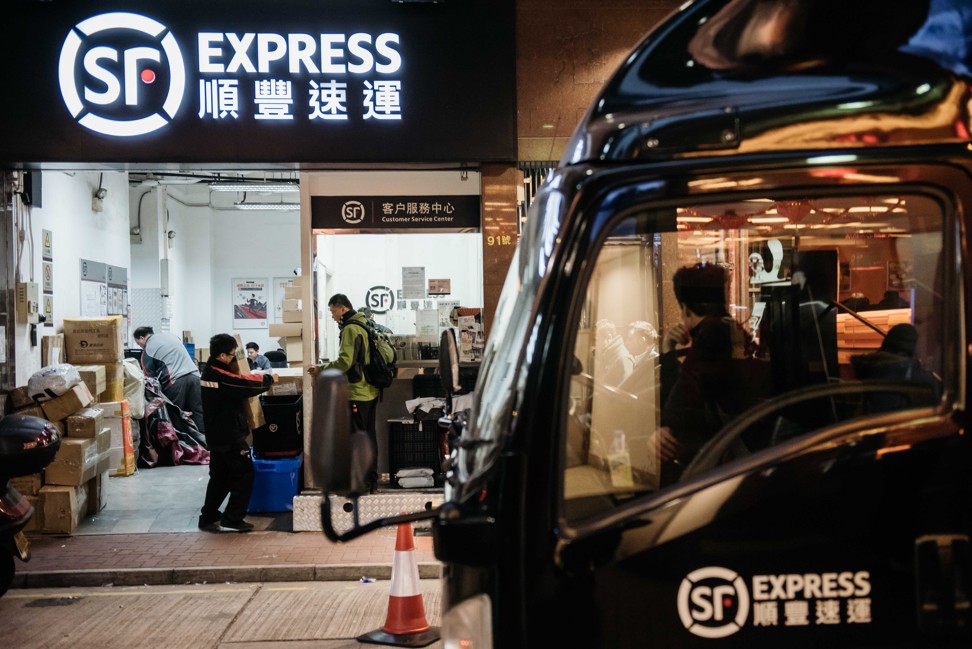
Update | Cainiao, SF Express in standoff over data, causing confusion among Chinese online shoppers
Parcel delivery and online shopping giants at issue over open access to data. SF Express shares fell as much as 3.7 to a two-week low at one point Friday, wiping 8.28b yuan of its value
A standoff has broken out between the logistics arm of the world’s largest online shop and one of its major couriers, in a tiff that’s thrown a cloud over parcel deliveries in China’s 6.2 trillion yuan (US$910 billion) online retail market.
Cainiao, the affiliate of Alibaba Group Holdings that organises the logistics of parcels bought through the Taobao and Tmall platforms, is going head-to-head with SF Holding Co, whose SF Express is among dozens of couriers that deliver those parcels.
At issue is access to data about the merchants that sell their products, and the shoppers that placed those orders. SF Express claimed in a Shenzhen stock exchange filing that Cainiao had removed it as a shipping option, and blocked access to data. Cainiao – controlled by Alibaba, which owns the South China Morning Post – responded by saying it was the courier that first walled off vital information.

The tussle is a potential flash point for a nation that is increasingly dependent on online commerce for everything from clothing to electronics to even foodstuff and fresh produce.
Xiong Yuan, a Beijing office worker, said the standoff between Cainiao and SF Express is going to hurt the convenience of online shopping, which she has been enjoying for years.
“I buy almost everything on Alibaba’s sites these days and I trust SF Express as the most reliable to deliver high-price online purchases,” Xiong said. “So how do I make the choice? Why is it that customers have to be the ones to compromise?”
China’s e-commerce industry is also grappling with problems such as bogus transactions, and counterfeiters who collude with couriers in replacing imports with bootleg products, all of which are problems that need data transparency to resolve.

The bureau was sensitive to the possibility that any online frustration among customers may escalate, particularly during the year when the Communist Party’s senior leadership is scheduled for a change of guard.
“Both parties should seek a solution on the basis of the largest possible common ground, abide by market order and consumers’ rights and refrain from exerting severe and negative social influence because of company feuding,” the bureau said.
SF Holdings shares fell as much as 3.7 per cent to an intraday low of 52 yuan, wiping out 8.28 billion yuan (US$1.21 billion) in market capitalisation, before closing the day at 53.29 yuan. Cainiao isn’t publicly traded.
While the postal bureau was urging diplomacy, some Chinese tech tycoons are taking sides in the quarrel.
Richard Liu Qiangdong, chairman and chief executive of Alibaba’s online shopping competitor JD.com, said Friday that he supported SF Holdings in the dispute, while calling for an official investigation into any data privacy breach on the courier firms’ platforms.
Both parties should seek a solution on the basis of the largest possible common ground, abide by market order and consumers’ rights and refrain from exerting severe and negative social influence because of company feuding
Customers have been effectively blocked from both companies’ platforms, rendering it harder to track the progress of their deliveries.
Cainiao has instructed online merchants to use alternative couriers, after SF Express refused to share its data of merchants and their customers.
“We are surprised and disappointed by SF Express’ abrupt action to stop providing the information that is necessary for the smooth completion of parcel deliveries,” Cainiao said in an emailed statement. “To protect more than a million of consumers and merchants from potential parcel losses, we have no option but to remove SF as a delivery option on Cainiao’s network.”
Ma Long, who sells imported beef steak on Tmall, said he has already tried to replace SF Express with alternatives.
“Because of the blockage in data access between SF Express and Alibaba, the records of my parcel dispatches don’t exist,” Ma said. “It’s a huge risk for my business, because shoppers can refuse to pay me even if they did receive their parcels.”
The company’s statement said that affected customers can still obtain information on their deliveries from the official website of SF Express and other third-party information-inquiry platforms.
For now, Cainiao appears to be extending the olive branch to resolve the tiff and close the chapter.
“Cainiao takes a collaborative approach towards logistics. We are committed to developing an open and collaborative data platform to enhance the efficiency of the logistics industry. We would like to continue our dialogue with SF to resolve the issue,” the company said in its statement.
With additional reporting from Laura He, Shidong Zhang and Meng Jing

